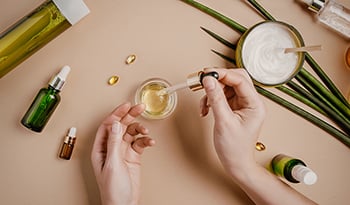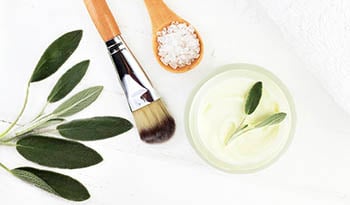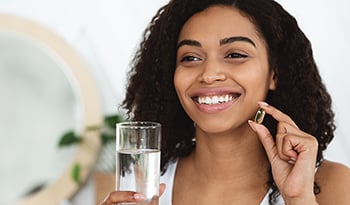The Best Supplements for Glowing Skin, Healthy Hair, and Strong Nails
DISCLAIMER:This blog does not intend to provide diagnosis...
- In this article:
- Supplements for Healthy Skin
- Vitamin C
- Vitamin E
- Omega-3 Fatty Acids
- Probiotics
- Supplements for Healthy Hair and Nails
- Vitamin D
- Biotin
- Supplements for Acne-Prone Skin
- Spearmint
- Turmeric

You are what you eat, and what you eat can often be reflected on your skin, hair, and nails. If you eat a lot of processed, high-sugar foods, it can lead to acne and a proinflammatory state causing premature aging. When our body is deficient in certain vitamins or minerals, our skin will look sallow, our hair limp and dull, and our nails brittle.
Achieving optimal nutrition through diet alone is just not realistic. We all try, but It’s hard to meet the dietary recommendations on a daily basis, especially for most of us with a busy work schedule. For those of us who are not able to get all these requirements through food, including myself, I recommend daily vitamins and nutritional supplements to help to support our overall health plus that of our skin, hair, and nails.
Supplements for Healthy Skin
Vitamin C
Vitamin C is important for our body and skin health. It is an essential nutrient our skin needs to make collagen. Collagen is the most abundant protein in our body. In addition to skin, it also supports our muscles, ligaments, tendons, and joints. Collagen is lost over time due to aging, which manifests as sagging of skin, fine lines, and wrinkles.
Vitamin C is also an antioxidant that helps to fight premature aging induced by the sun and our environment. It is a water-soluble nutrient that is not produced by our body, therefore it’s critical that we obtain it through diet. Good sources of vitamin C include citrus fruit such as lemon, oranges, and grapefruit; vegetables including bell peppers, broccoli, kale, and brussel sprouts, just to name a few.
Daily supplementation of vitamin C at 500-1000mg can be taken for those who are not able to keep up with dietary recommendations. Because it is water-soluble and excreted through urine, over-ingesting and toxicity is uncommon.
Vitamin E
Vitamin E is another important nutrient, like vitamin C, that has antioxidant properties. In fact, the two often work better together. Vitamin E helps to prevent DNA damage induced by free radicals generated by the sun and pollutants. It also helps to strengthen our immune system and prevent blood clots. Many topical formulations of vitamin E plus C are available to help fight sun damage and reverse signs of aging.
Vitamin E is fat-soluble and can be found in food such as leafy greens, nuts, avocado, and plant oil such as sunflower oil. Since vitamin E is fat-soluble, it is not as easily metabolized as vitamin C. To avoid build-up and toxicity, limit supplementation to < 15mg daily.
Omega-3 Fatty Acids
There are numerous health benefits from omega-3s. These essential fats need to be consumed through food or supplements as our body is not able to produce them naturally. Fatty acids are an important component of cellular membranes and help to fight inflammation. They also may play a role in the prevention of some chronic diseases.
Over time our skin dries and dulls from chronic sun exposure and natural aging. Omega 3s help to decrease inflammation and repair the skin barrier, allowing our skin to function properly and form that healthy “glow.” Omega-3s have also been found to help with chronic skin conditions such as eczema and psoriasis. Salmon is a great source of omega-3, but taking a fish oil supplement daily is a great alternative.
Probiotics
The body’s microbiome plays an important role in keeping our body healthy and balanced. We know that in many inflammatory diseases, there’s often an imbalance between good and bad bacteria.
Daily probiotic supplements help to decrease bloating in patients with IBS and also decrease the amount of inflammation seen in individuals with chronic skin diseases such as eczema. Clinical studies have shown that in patients with atopic dermatitis who took daily probiotic, there was a decrease in the frequency of topical steroid application compared to that in the control group.
Supplements for Healthy Hair and Nails
Vitamin D
Vitamin D is a fat-soluble vitamin that is made on our skin upon UV exposure. It has numerous biological effects on our body including promoting bone health, modulating inflammation, and hair health. Research has shown that vitamin D may also play a role in modulating autoimmune disease by regulating gut bacteria.
Individuals who experience extensive and diffuse hair loss and brittle hair often have vitamin D deficiency. Most people do not synthesize sufficient amounts of vitamin D from sun exposure alone, and chronic sun exposure is not recommended for the risk of skin cancer and aging. It is best to consume vitamin D through supplements and food. Fatty fish, soy products, and egg yolks are high in vitamin D. Taking a daily supplement of 800-1000IU is recommended for the average adult.
Biotin
Biotin is a water-soluble B7 vitamin needed by our body to convert nutrients into energy. It is essential to our body’s daily function, especially during pregnancy and breastfeeding.
Biotin also plays a vital role in maintaining strong and healthy nails and hair. Exactly how biotin works is unclear. It’s been found to strengthen keratin, the building blocks of our skin, hair, and nails. Clinical studies have shown that biotin supplements can improve hair growth, and make brittle nails stronger.
Taking a biotin supplement daily helped me recover from my postpartum hair loss. I recommend ones that also contain a few other vitamins and minerals including zinc. Zinc helps to fight free radical damage, and like biotin, it is essential for cellular metabolism, immunity, and fighting inflammation.
Supplements for Acne-Prone Skin
Acne is the most common condition that brings individuals to my office. Acne doesn’t just affect teenagers--a handful of adults in their 20s, 30s, 40s, and even older will be afflicted by acne.
Hormonal acne in women can be frustrating. It manifests as deep pimples on the cheeks, jawline, chin, and even neck, often worsening around their periods. Although the most effective treatments are prescription medications to counter the hormone flares, not everyone is able to tolerate these treatments. Below are two natural ways I’ve found to help my skin stay clear without medications.
Spearmint
Spearmint has well-known anti-androgen effects. It also has anti-inflammatory and anti-microbial properties. Spearmint modulates hormones that are increased during our menstrual cycle. These hormones then stimulate our oil glands and ultimately lead to deep cystic-like pimples around menses. Clinical studies have shown that 1 cup of spearmint tea twice daily has moderate effects on improving hormonal acne.
Turmeric
A very popular ingredient in India, turmeric has long been used for centuries as medicine. Curcumin is the active compound isolated from turmeric that has antioxidant, anti-inflammatory and anti-carcinogenic properties. Being one of the most heavily studied spices, turmeric has shown many promising results in laboratory studies. Curcumin has shown potential in inhibiting propionibacterium, an important bacteria involved in the pathogenesis of acne. In addition to acne, turmeric may be helpful in fighting psoriasis, eczema, and even aging. Given that topical formulations such as skin care products or masks can irritate and stain the skin yellow, I recommend daily supplementation in powder form. Consider adding turmeric to your smoothie, curry, or tea--this is an easy, effective, and multipurpose way to add more antioxidants to your diet.
Remember that great skin, hair, and nails are more than what you put on them--diet and nutrition play a huge role. Combining a good diet with regular exercise, adequate time for self-care and stress relief will ensure a clear mindset, healthy body, and glowing skin.

 By Dr. Jenny Liu, M.D.
By Dr. Jenny Liu, M.D.


